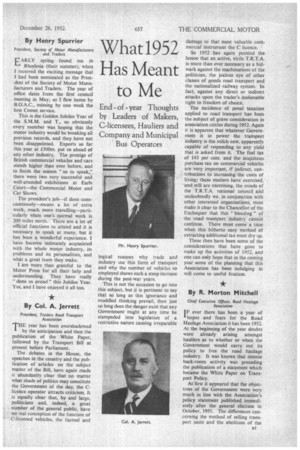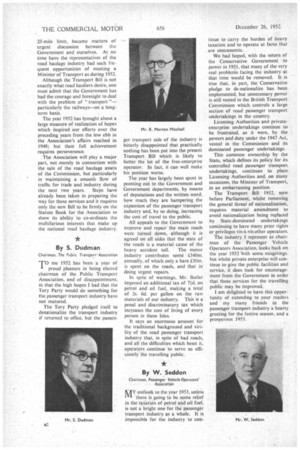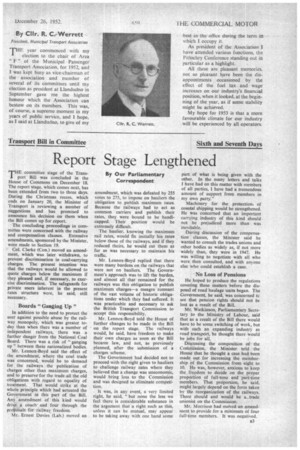What1952 Has Meant to Me
Page 35

Page 36

Page 37

If you've noticed an error in this article please click here to report it so we can fix it.
End of year Thoughts by Leaders of Makers, C-licensees, Hauliers and Company and Municipal Bus Operators
By Henry Spurrier
President, Society of Motor Manufacturers and Traders EARLY spring found me in Rhodesia (their summer), when received the exciting message that I had been nominated as the President of the Society of Motor Manufacturers and Traders. The year of office dates from the first council meeting in May; so I flew home by B.O.A.C., missing by one week the first Comet service.
This is the Golden Jubilee Year of the S.M.M. and T., so obviously every member was hoping that the motor industry would be breaking all previous records, and they have not been disappointed. Exports so far this year at £300m. put us ahead of any other industry. The prestige of British commercial vehicles and cars stands higher than ever before, and to finish the season "so to speak," there were two very successful and well-attended exhibitions at Earls Court—the Commercial Motor and Car Shows.
The president's job—if done conscientiously—means a lot of extra work, much more travelling—particularly when one's normal work is 200 miles north. There are a lot of official functions to attend and it is necessary to speak at many, but it has been a wonderful experience. I have become intimately acquainted with the whole motor industry, its problems and its personalities, and what a great team they make.
I km more than grateful to the Motor Press for all their help and understanding. They have really "done us proud" this Jubilee Year. Yes, and I have enjoyed it all too,
By Col. A. Jerrett
President, Traders Rood Transport Association THE year has been overshadowed
by the anticipation and then the publication of the White Paper, followed by the Transport Bill at present before Parliament.
The debates in the House, the speeches in the country and the publication of articles on the subject matter of the Bill, have again made it abundantly clear that no matter what shade of politics may constitute the Government of the day, the Clicence operator attracts criticism. It is equally clear that, by and large, politicians and, indeed, a great number of the general public, have no real conception of the function of C-licensed vehicles, the factual and logical reasons why trade and industry use this form of transport and why the number of vehicles so employed shows such a steep increase during the post-war years.
This is not the occasion to go into this subject, but it is pertinent to say that so long as this ignorance and muddled thinking prevail, then just so long does the danger exist that any Government might at any time be stampeded into legislation of a restrictive nature causing irreparable damage to that most valuable commercial instrument the C licence.
So 1952 has again pointed the lesson that an active, virile T.R.T.A. is more than ever necessary as a bulwark against the machinations of the politician, the jealous eye of other classes of goods road transport and the nationalized railway system. In fact, against any direct or indirect attacks upon the trader's inalienable right to freedom of choice.
The incidence of penal taxation applied to road transport has been the subject of grave consideration in association circles during 1952. Again it is apparent that whatever Government is in power the transport industry is the milch cow, apparently capable of responding to any yield that is asked from it. The fuel tax of 143 per cent. and the iniquitous purchase tax on commercial vehicles are very important, if indirect, contributions to increasing the costs of living; these matters have exercised, and still are exercising, the minds of the TR.T.A. national council and undoubtedly we, in conjunction with other interested organizations, must make it clear to the Chancellor of the Exchequer that this " bleeding " of the road transport• industry. cannot continue. There must come a time when this hitherto easy method of extracting additional tax must dry up.
These then have been some of the considerations that have gone to make up the activities of 1952, and one can only hope that in the coming year some of the planning that this Association has been indulging in will come to useful fruition.
By R. Morton Mitchell
Chief Executive Officer, Road Haulage Association
IF ever there has been a year of I hopes and fears for the Road Haulage Association it has been 1952. At the beginning of the year doubts were already arising amongst hauliers as to whether or when the Government would carry out its policy to free the road haulage industry. It was known that intense back-room activity was preceding the publication of a statement which became the White Paper on Transport Policy.
At'first it appeared that the objectives of the Government were very much in line with the Association's policy statement published immediately after the general election in October, 1951. The differences concerning the method of selling transport units and the abolition of the 25-mile limit, became matters of urgent discussion between the Government and ourselves. At no time have the representatives of the road haulage industry had such frequent opportunities of meeting a Minister of Transport as during 1952.
Although the Transport Bill is not exactly what road hauliers desire, one must admit that the Government has had the courage and foresight to deal with the problem of "transport "particularly the railways—on a longterm basis.
The year 1952 has byought about a large measure of realization of hopes which inspired our efforts over the preceding years from the low ebb in the Association's affairs reached in 1948; but their full achievement requires perseverence.
The Association will play a major part, not merely in connection with the sale of the road haulage assets of the Commission, but particularly in maintaining a smooth flow of traffic for trade and industry during the next two years. Steps have already been taken in preparing the way for these services and it requires only the new Bill to be firmly on the Statute Book for the Association to show its ability to co-ordinate the multifarious interests that make up the national road haulage industry.
By S. Dudman Chairman. The Public Transport' Association
TO me 1952 has been a year of proud pleasure in being elected chairman of the Public Transport Association, and of disappointment, in that the high hopes I had that the Tory Party would do something for the passenger transport industry have not matured.
The Tory Party pledged itself to denationalize the transport industry if returned to office, but the passer'. ger transport side of the industry is bitterly disappointed that practicallynothing has been put into the present Transport Bill which is likely to better the lot of the free-enterprise operator. In fact, it can well make his position worse.
The year has largely been spent in pointing out to the Government and Government departments, by means of deputations and the written .word, how much they are hampering the expansion of the passenger transport industry and, by so doing, increasing the cost of travel to the public.
All appeals to the Government to improve and repair the main roads were turned down, although it is agreed on all sides that the state of the roads is a material cause of the
heavy accident toll. The motor industry contributes some £340m. annually, of which only a bare £30m. is spent on the roads, and that in doing urgent repairs.
In spite of warnings, Mr. Butler imposed an additional tax of 71.d. on petrol and oil fuel, making a total of 2s. 6d. per gallon on the raw materials of our industry. This is a penal and discriminatory tax which increases the cost of living of every person. in these Isles.
It says an enormous amount for the traditional background and virility of the road passenger transport industry that, in spite of bad roads, and all the difficulties which beset it, operators continue to serve so efficiently the travelling public.
By W. Seddon
Chairman, Passenger Vehicle Operators' Association
MY outlook to the year 1953, unless there is going to be some relief in the taxation of petrol and oil fuel, is not a bright one for the passenger transport industry as a whole. It is impossible for the industry to con
Untie to carry the burden of heavy taxation and to operate at fares that are uneconomic.
We had hoped, with the return of the Conservative Government to power in 1951, that many of the very real problems facing the industry at that time would be removed. It is true that, in part, the Conservative pledge to de-nationalize has been implemented, but unnecessary power is still vested in the British Transport Commission which controls a large section of road passenger transport undertakings in the country.
Licensing Authorities and privateenterprise undertakings continue to be frustrated, as it were, by the powers and duty under the 1947 Act, vested in the Commission and its dominated passenger undertakings.
This common ownership by the State, which defines its policy for its controlled road passenger transport undertakings, continues to place Licensing Authorities and, on many occasions, the Minister of Transport, in an embarrassing position.
The Transport Bill 1952, now before Parliament, whilst removing the general threat of nationalization, requires material amendment to avoid nationalization being replaced by State-dominated undertakings continuing to have many prior rights or privileges vis-a-vis other operators.
The industry I represent as chairman of the Passenger Vehicle Operators Association, looks back on the year 1952 with some misgivings, but whilst private enterprise will continue to give the public facilities and service, it does look for encouragement from the Government in order that these services for the travelling public may be improved.
1 am delighted to have this opportunity of extending to your readers and my many friends in the passenger transport industry a hearty greeting for the festive season, and a prosperous 1953.
• By CIIr. R. C.-Werrett
President, Municipal Transport Association
THE year commenced with my election to the chair of Area "F" of the Municipal Passenger Transport Association, for 1952, and I was kept busy as vice-chairman of the association and member of several of its committees until my election as president at Llandudno in September gave me the highest honour which the Association can bestow on its members. This was, of course, a supreme moment in my years of public service, and I hope, as I said at Llandudno, to give of my best in the office during the term in which I occupy it.
As president of the Association I have attended various functions, the Pitlochry Conference standing out in particular as a highlight.
All these are pleasant memories. not so pleasant have been the disappointments occasioned by the effect of the fuel tax and wage increases on our industry's financial position, when it looked, at the beginning of the year, as if some stability might be achieved.
My hope for 1953 is that a more favourable climate for our industry . will be experienced by all operators.












































































